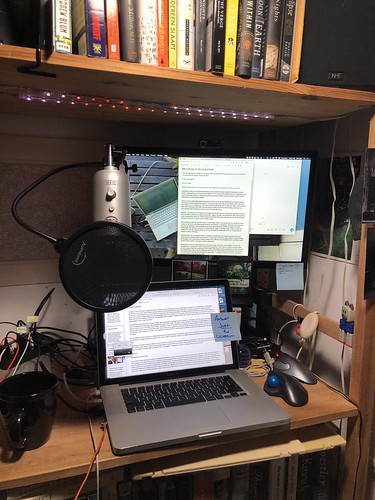So I was just on BBC Radio 4’s morning show (it’s night here in California, but 8 hours ahead in London, people are having their coffee and checking the weather). I was on with Paul Johnson of the Institute of Fiscal Studies, talking about careers, aging, retirement, and the challenge of making work suitable for populations that have longer life expectancy (and increasingly, social safety nets and retirement systems that suck).
This was a bit of a last-minute thing: I got a message from a producer this morning asking if I was available, we did a sound check a couple hours later, and they rang me up a couple minutes before the segment ran.
I find that I perform better in these situations when I don’t just rely on my natural brilliance and extemporaneous speaking ability, but actually do some prep– which for me means writing some note about the subject beforehand. (I’ve written other posts about doing radio.)
Here’s what I wrote out and was trying to get across:
People who have very long and productive careers often alternate periods of intensive focused activity, with periods for recovery and reflection. This is true at the weekly level (i.e., detaching from work and having hobbies or other things that occupy your time), and at the level of years (having sabbaticals or other longer breaks).
This is a more sustainable pattern because, as recent work by neuroscientists and psychologists has shown, humans effectively focus for 4-5 hours a day. We’re also more creative when we have time built into our schedules for both hard work and deliberate rest. Finally, we vastly underestimate how much checking email after-hours erodes our ability to recover and recharge, and both our technologies and professional norms make that problem worse.
Whether consciously or not, parents who take time off with their young children, professionals who burn out after a decade in a high-pressure job, “digital nomads” who spend their 20s doing projects while traveling the world, etc. are all trying to find alternatives that play around with more extended periods of time off, or remix work and other things.
But companies have yet to make sense of these experiments, and instead see the traditional linear career as the norm, and these experiments as concessions or deviations. They also see long hours as a sign of dedication and productivity, and have generally been unwilling to share increased productivity with workers in the form of either higher wages or shorter hours. Finally, we see this problem of work-life balance mainly as one to be solved by individuals, not as an organizational design or policy challenge.
However, there are companies (mainly in software, advertising, and financial services) that have shown that it’s possible right now to shift to a 4-day week, or a 6-hour day, simply by using existing technology more productively, making meeting more efficient, and redesigning the workday to give people longer periods of focused, uninterrupted time.
Companies moving to 4-day weeks show that ever-longer hours are not inevitable, nor are they necessary for a company to make money and do good work. And if we can move to a 4-day week just by using our time and technology more wisely, this suggests that by designing new technologies like robots and AI with an eye to helping workers become more skilled and productive, and sharing the resulting time savings with workers, a 3-day week— or Keynes’ vision of a 15-hour workweek— could be closer to hand than we think.
The challenge we face now is to figure out how we can put these parts together: to do things like shorten the work day, rebuild the wall between work and private time, and design careers that allow for longer breaks and sabbaticals.
It’s not that you find the paragraph that best fits the question the presenter asks and then read it, but rather, the point of the exercise is to get you thinking about a subject, and give you a starting-point.
You’ll also notice the post-it that says “Answer JUST the Question.” This is a constant issue with me: I tend to want to answer a question and then discuss the implications, or a related point, and in a short-format radio show, you have to curb than instinct, and let the presenter guide the conversation. (BBC presenters, in my experience, are really outstanding, so it’s best to let them lead.)
Having a serious microphone is also a MUST for things like this. I love my Yeti Blue mic, and adding the wind guard and stand has only improved both the audio quality and ease of use.
I think I’m slowly getting better at these things. It’s not something that comes effortlessly, but it is possible to improve!
Now to bed, as I have to be up very early tomorrow!
